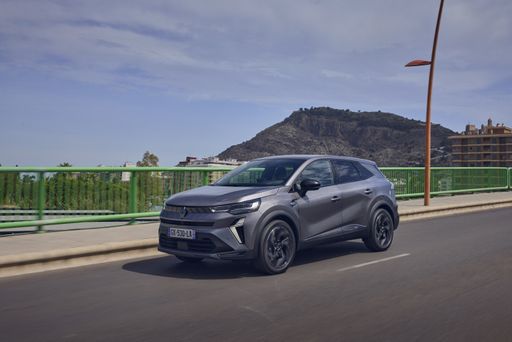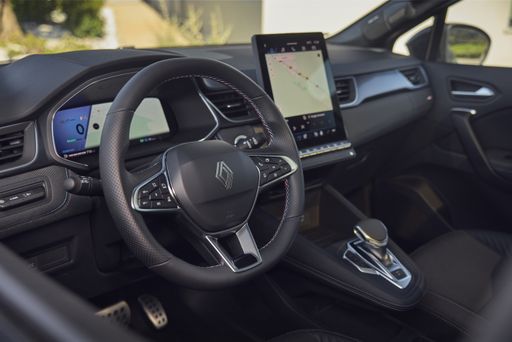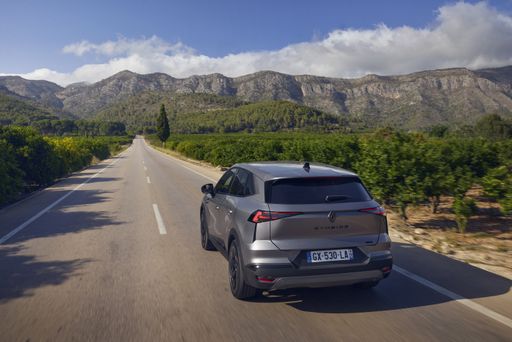Hyundai Kona VS Renault Symbioz
In the competitive compact SUV segment, the Hyundai Kona stands out with its bold design and advanced technology features, offering drivers a dynamic and engaging driving experience. In contrast, the Renault Symbioz takes a more futuristic approach, emphasizing sustainability and autonomous driving capabilities, making it a symbol of the brand's vision for the future of mobility. While the Kona appeals to enthusiasts seeking a stylish and versatile vehicle, the Symbioz captivates with its innovative concepts that challenge conventional automotive norms.
Hyundai Kona
The Hyundai Kona blends a bold design with a versatile interior, making it a standout choice in the compact SUV market. Its crisp handling and responsive steering provide an engaging driving experience, whether in the city or on the open road. The vehicle also offers a range of features designed to enhance comfort and connectivity, ensuring a pleasurable journey for both driver and passengers.
detailsRenault Symbioz
The Renault Symbioz is an innovative concept car that explores the future of autonomous and connected driving. Its design seamlessly integrates indoor living space features with cutting-edge automotive technology, creating a comfortable and modern environment. The Symbioz highlights Renault's vision of an eco-friendly and connected mobility experience, paving the way for the next generation of smart vehicles.
detailsHyundai Kona vs. Renault Symbioz: A Comprehensive Comparison
In the evolving landscape of the automotive market, the compact SUV segment has garnered significant attention for its versatility, efficiency, and technological advancements. Two notable contenders in this category are the Hyundai Kona and the Renault Symbioz. Both offer compelling features, but how do they compare in terms of technical specifications and innovations? Let’s dive into the details.
Engine and Performance
The Hyundai Kona comes with a diverse range of powertrains to cater to various driver preferences. It offers petrol, full hybrid, and fully electric options, with power ratings ranging from 100 HP to a robust 218 HP. Each variant provides a different performance signature, with the impressive electric models achieving a top speed of 201 km/h and a swift acceleration from 0 to 100 km/h in as quick as 7.8 seconds. This makes the Kona not just a practical choice but also a sporty one.
On the other hand, the Renault Symbioz exclusively features a full hybrid engine producing 143 HP. While it has a slightly lower maximum speed of 170 km/h and a 0-100 km/h time of 10.6 seconds, it remains competitive with its efficient fuel consumption of just 4.8 L/100km. For those who prioritize efficiency over raw power, the Symbioz may prove to be the better option.
Design and Dimensions
In terms of exterior dimensions, the Hyundai Kona is slightly shorter than the Renault Symbioz, measuring 4350 mm in length compared to the Symbioz's 4413 mm. However, the Kona is wider at 1825 mm versus the Symbioz's 1797 mm, which helps to create a sportier stance on the road. The Kona also boasts a height of 1585 mm, providing a commanding driving position.
Interiors in both SUVs offer comfortable seating for five passengers, with the Kona providing a trunk capacity of 466 liters, slightly lower than the Symbioz's 492 liters. This makes the Symbioz a preferable option for those needing additional cargo space.
Fuel Economy and Emissions
The Kona presents impressive fuel efficiency statistics across its petrol and hybrid variants. Its fuel consumption ranges from 4.5 to 6.7 L/100km, depending on the engine selected. Its electric variants also shine with a consumption of just 14.6 to 16.8 kWh/100km and an electric driving range of up to 514 km.
Meanwhile, the Renault Symbioz earns high marks for its efficiency with CO2 emissions of 109 g/km, which aligns it within a respectable CO2 efficiency class C. Its single full hybrid engine configuration ensures lower emissions while retaining performance.
Innovation and Technology
Hyundai has equipped the Kona with cutting-edge technology, including an advanced infotainment system, multiple drive modes, and safety features like lane-keeping assist and adaptive cruise control. Moreover, the Kona’s hybrid and electric variants are imbued with regenerative braking technology, enhancing energy efficiency during drives.
Renault's Symbioz focuses heavily on integration with smart technology, emphasizing connectivity through its multimedia system that seamlessly integrates with smartphones and home devices. It embodies Renault's commitment to a smart and eco-friendly future, showcasing their innovative hybrid technology.
Conclusion: Which SUV Reigns Supreme?
Choosing between the Hyundai Kona and the Renault Symbioz ultimately depends on individual preferences and requirements. For those seeking a versatile SUV with multiple powertrain options and sporty performance, the Hyundai Kona stands out. However, for drivers leaning towards efficiency and smart technology integration, the Renault Symbioz offers an excellent choice.
Both vehicles showcase the automakers' commitment to innovation and sustainability in the ever-competitive SUV market. Depending on your priorities, either of these remarkable SUVs could be the perfect fit for your driving needs.
 @ hyundai.news
@ hyundai.news
 @ hyundai.news
@ hyundai.news
 @ hyundai.news
@ hyundai.news
 @ hyundai.news
@ hyundai.news
 @ media.renault.at
@ media.renault.at
 @ media.renault.at
@ media.renault.at
 @ media.renault.at
@ media.renault.at

|

|
|
|
|
Costs and Consumption |
|
|---|---|
|
Price
about 24400 - 44800
$
|
Price
about 28600 - 32800
$
|
|
Consumption L/100km
4.5 - 6.7
L
|
Consumption L/100km
4.8
L
|
|
Consumption kWh/100km
14.6 - 16.8
kWh
|
Consumption kWh/100km
-
|
|
Electric Range
377 - 514
km
|
Electric Range
-
|
|
Battery Capacity
1.3 - 65.4
kWh
|
Battery Capacity
0.6
kWh
|
|
co2
128, 103, 141, 152, 0
g/km
|
co2
109
g/km
|
|
Fuel tank capacity
38 - 47
L
|
Fuel tank capacity
48
L
|
Dimensions and Body |
|
|
Body Type
SUV
|
Body Type
SUV
|
|
Seats
5
|
Seats
5
|
|
Doors
5
|
Doors
5
|
|
Curb weight
1370 - 1773
kg
|
Curb weight
1498
kg
|
|
Trunk capacity
466
L
|
Trunk capacity
492
L
|
|
Length
4350 - 4385
mm
|
Length
4413
mm
|
|
Width
1825
mm
|
Width
1797
mm
|
|
Height
1580 - 1585
mm
|
Height
1575
mm
|
|
Payload
420 - 490
kg
|
Payload
427
kg
|
Engine and Performance |
|
|
Engine Type
Petrol, Full Hybrid, Electric
|
Engine Type
Full Hybrid
|
|
Transmission
Manuel, Automatic
|
Transmission
Automatic
|
|
Transmission Detail
Manual Gearbox, Automat. Schaltgetriebe (Doppelkupplung), Reduction Gearbox
|
Transmission Detail
Automatic Gearbox
|
|
Drive Type
Front-Wheel Drive, All-Wheel Drive
|
Drive Type
Front-Wheel Drive
|
|
Power HP
100 - 218
HP
|
Power HP
143
HP
|
|
Acceleration 0-100km/h
7.8 - 13.3
s
|
Acceleration 0-100km/h
10.6
s
|
|
Max Speed
162 - 208
km/h
|
Max Speed
170
km/h
|
|
Torque
200 - 265
Nm
|
Torque
250
Nm
|
|
Number of Cylinders
3 - 4
|
Number of Cylinders
3 - 4
|
|
Power kW
74 - 160
kW
|
Power kW
105
kW
|
|
Engine capacity
998 - 1598
cm3
|
Engine capacity
1598
cm3
|
|
Top speed
162 - 208
km/h
|
Top speed
170
km/h
|
General |
|
|
Model Year
2024
|
Model Year
2024
|
|
CO2 Efficiency Class
D, C, E, A
|
CO2 Efficiency Class
C
|
|
Brand
Hyundai
|
Brand
Renault
|
Hyundai Kona
The Hyundai Kona: A Comprehensive Overview
The Hyundai Kona has established itself as a standout in the compact SUV segment, blending innovation with performance and style. As the automotive world moves towards more sustainable and efficient options, the Kona offers a variety of powertrains, from traditional petrol engines to full hybrids and all-electric models.
Powertrain Options and Performance
The Hyundai Kona's powertrain choices cater to a wide range of preferences. For petrol enthusiasts, the Kona offers a 1.0L T-GDI engine, delivering 100 PS, and a more robust 1.6L T-GDI variant with up to 170 PS. Those looking for efficiency without sacrificing power can consider the full hybrid model, offering 129 PS and an impressive consumption of 4.5 L/100km.
For a greener option, the all-electric Kona provides a compelling case. With battery capacities of up to 65.4 kWh, the electric Kona offers power outputs of 156 to 218 PS, and efficiencies as low as 14.6 kWh/100km, enabling an electric range of up to 513 km.
Technical Specifications and Innovations
Built on a robust platform, the Kona delivers versatility and reliability. With a choice between manual or dual-clutch automatic gearboxes, along with options for front-wheel or all-wheel drive, the Kona ensures a tailored driving experience. The handling is enhanced by the car's lightweight construction, balancing a 1370 to 1773 kg curb weight with dynamic performance.
The Kona's design doesn't compromise cargo space for style; it offers a generous 466 L boot capacity. With a relatively compact body, measuring 4350 to 4385 mm in length, the Kona easily navigates urban environments while still commanding a strong road presence with its 1825 mm width.
Efficiency and Eco-Friendliness
Hyundai is committed to reducing emissions, as evidenced by the Kona's CO2 efficiency ratings, which range from class A for electric models to class D for some higher-performance petrol variants. The focus on reducing environmental impact without sacrificing driving pleasure is notable throughout the Kona range.
Costing and Value
The Hyundai Kona offers commendable value for money. Pricing starts at €26,400 and reaches up to €50,690, depending on the chosen configuration. The monthly running costs range from €956 to €1090, with a cost per kilometre of 38.3 to 43.6 cents, making it a competitive option in its class.
Conclusion: Modern, Efficient, and Versatile
The Hyundai Kona stands as a testament to Hyundai's commitment to innovation, efficiency, and practicality. Whether you are inclined towards a traditional combustion engine, a hybrid for a balance of power and efficiency, or a full electric model for maximum eco-friendliness, the Kona provides a tailored solution for each unique driver preference.
Renault Symbioz
Discover the Future: The Renault Symbioz
As we transition into a new era of automotive technology, the Renault Symbioz stands as a beacon of innovation and sustainability. Designed with the modern driver in mind, this SUV redefines what it means to integrate elegant design with cutting-edge technology. Delve into the details of this impressive vehicle and see what sets it apart from the competition.
Unveiling Its Power: Hybrid Engine and Performance
At the heart of the Renault Symbioz is a full hybrid powertrain that combines efficiency with performance. The 143 PS engine, delivering 105 kW, ensures a smooth and responsive driving experience. Coupled with a front-wheel-drive automatic transmission, the Symbioz offers remarkable fuel economy at just 4.8 L/100 km, making it a top contender in the eco-friendly vehicle market.
Innovation Meets Design: Aesthetics and Aerodynamics
With dimensions measuring 4413 mm in length, 1797 mm in width, and 1575 mm in height, the Symbioz presents a striking and sleek profile. The vehicle marries form and function perfectly, enhancing aerodynamics while maintaining a comfortable and spacious interior. Its lightweight build, with a gross weight of 1498 kg, complements its agile handling and stability on the road.
Interior Elegance and Technology
The Renault Symbioz is not only about performance but also about offering a refined driving experience. The interior is meticulously designed to provide comfort for up to five occupants, boasting a generous boot space of 492 litres. High-quality materials and advanced infotainment systems enhance the driving experience, incorporating state-of-the-art technology seamlessly.
Bridging Sustainability and Performance
With CO2 emissions of 109 g/km and a CO2 efficiency class of C, the Renault Symbioz aims to reduce environmental impact without compromising on performance. Its 1.6-litre engine, composed of three cylinders, delivers a perfect synergy of power and efficiency, showcasing Renault’s commitment to innovative, responsible motoring.
Optional Trims: Tailoring to Your Preferences
Available in three distinct trim levels—Esprit Alpine, Iconic, and Techno—the Symbioz allows customers to customise their driving experience further. Each comes equipped with multi-mode automatic transmission options that cater to various driving styles, ensuring a tailored approach to modern driving needs.
Price and Availability
The Renault Symbioz is competitively priced, ranging between €32,550 and €35,450, depending on the selected trim. With its advanced features and cutting-edge technology, this vehicle provides significant value in the current automotive market.
Conclusion: A Vision of Tomorrow, Today
The Renault Symbioz is not just an SUV; it represents a commitment to a sustainable and technologically advanced future. By marrying superior performance with eco-conscious engineering, Renault has set a new benchmark in the automotive industry. The Symbioz is poised to captivate drivers around the world, embodying a seamless blend of innovation, efficiency, and style.
